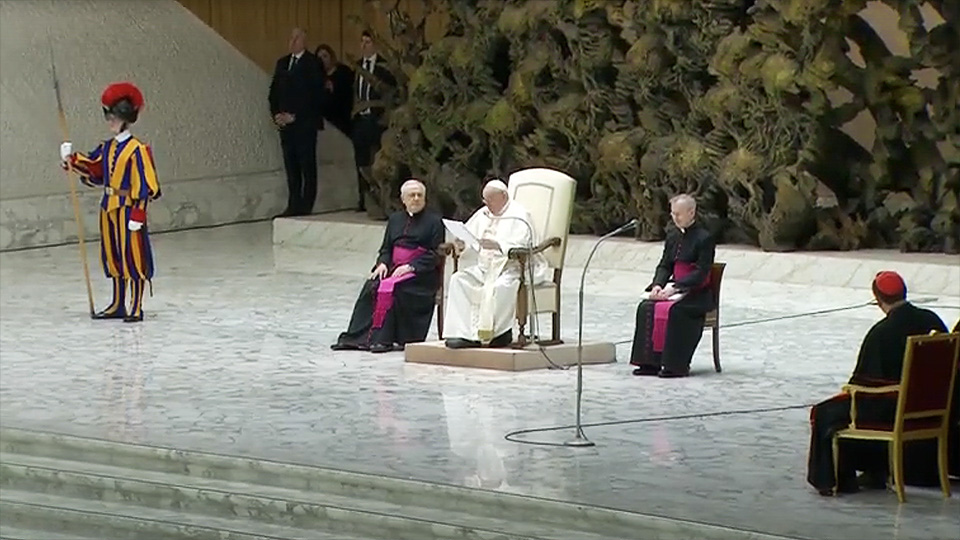

Pope's General Audience - February 15, 2023
Pope Francis
Wednesday, February 15, 2023

In today's General Audience, Pope Francis reflected on a portion of Matthew chapter 10 as a guide to proclaiming the Gospel. He said that this "missionary discourse" from Matthew's Gospel teaches us "why [we] proclaim, what to proclaim and how to proclaim." Read the full text below:Dear brothers and sisters, good morning! We continue our catechesis; the theme we have chosen is “The passion of evangelizing, apostolic zeal.” Because evangelizing is not saying, ‘Look, blah, blah, blah’ and nothing more. There is a passion that involves everything: the mind, the heart, the hands, going out… everything, the whole person is involved with this proclamation of the Gospel, and for this reason we talk about the passion for evangelizing. After having seen in Jesus the model and the master of proclamation, we turn today to the first disciples, to what the disciples did. The Gospel says that Jesus “appointed twelve, to be with Him, and to be sent out to preach” (Mark 3:14), two things: to be with him and to send them to preach. There is one aspect that seems contradictory: He called them to be with Him and to go and preach. One would say: either one or the other, either stay or go. But no: for Jesus there is no going without staying and there is no staying without going. It is not easy to understand this, but that’s the way it is. Let us try to understand a little bit what is the sense in which Jesus says these things. First of all, there is no going without staying: before sending the disciples on mission, Christ—the Gospel says—“calls them to Himself.” (cf. Matthew 10:1) The proclamation is born from the encounter with the Lord; every Christian activity, especially the mission, begins from there. Not from what is learnt in an academy. No, no! It begins from the encounter with the Lord. Witnessing Him, in fact, means radiating Him; but, if we do not receive His light, we will be extinguished; if we do not spend time with Him, we will bear ourselves instead of Him—I am bringing myself and not Him—and it will all be in vain. So only the person who remains with Him can bring the Gospel of Jesus. Someone who does not remain with Him cannot bear the Gospel. He will bring ideas, but not the Gospel. Equally, however, there is no staying without going. In fact, following Christ is not an inward looking fact: without proclamation, without service, without mission, the relationship with Jesus does not grow. We note that in the Gospel the Lord sends the disciples before having completed their preparation: shortly after having called them, He is already sending them! This means that the mission experience is part of Christian formation. Let us then recall these two constitutive moments for every disciple: staying with Jesus and going forth, sent by Jesus. Having called the disciples to Himself and before sending them, Christ addresses a discourse to them, known as the ‘missionary discourse’—this is what it is called in the Gospel. It is found in chapter 10 of Matthew’s Gospel and is like the ‘constitution’ of the proclamation. From that discourse, which I recommend you read today—it is only one page in the Gospel—I draw out three aspects: why proclaim, what to proclaim, and how to proclaim. Why to proclaim: The motivation lies in a few words of Jesus, which it is good for us to remember: “Freely you have received, freely give.” (v. 8) They are just a few words. But why proclaim? Because I have received freely, and I should give freely. The proclamation does not begin from us, but from the beauty of what we have received for free, without merit: meeting Jesus, knowing Him, discovering that we are loved and saved. It is such a great gift that we cannot keep it to ourselves, we feel the need to spread it; but in the same style, right? That is, in gratuitousness. In other words: we have a gift, so we are called to make a gift of ourselves; we have received a gift and our vocation is to make a gift of ourselves to others; there is in us the joy of being children of God, it must be shared with our brothers and sisters who do not yet know it! This is the reason for the proclamation. Going forth and bringing the joy of what we have received. Second: What, then, to proclaim? Jesus says: “Preach as you go, saying, ‘The kingdom of heaven is at hand.’” (v. 7) This is what must be said, first and foremost: God is near. So, never forget this: God has always been close to the people. He said it to the people Himself: He said, “Look, what God is as close to the nations as I am to you?” This closeness is one of the most important things about God. There are three important things: closeness, mercy, and tenderness. Don’t forget that. Who is God? The One Who is Close, the One Who is Tender, the One Who is Merciful. This is the reality of God. We, in preaching, often urge people to do something, and that is fine; but let’s not forget that the main message is that He is near: closeness, mercy, and tenderness. Accepting God’s love is more difficult because we always want to be in the centre, we want to be protagonists, we are more inclined to do than to let ourselves be moulded, to speak than to listen. But, if what we do comes first, we will still be the protagonists. Instead, the proclamation must give primacy to God: to give the primacy to God, the first place to God, and to give to others the opportunity to welcome Him, to realise that He is near. And me in the background. The third point: how to proclaim. This is the aspect Jesus dwells on most: how to proclaim, what is the method, what should be the language for proclaiming; it’s significant: He tells us that the manner, the style is essential in witnessing. Witnessing does not just involve the mind and saying something, the concepts. No. It involves everything, mind, heart, hands, everything, the three languages of the person: the language of thought, the language of affection, and the language of work. The three languages. One cannot evangelise only with the mind or only with the heart or only with the hands. Everything is involved. And, in style, the important thing is testimony, as Jesus wants us to do. He says this: “I send you out as sheep among wolves.” (v. 16) He does not ask us to be able to face the wolves, that is, to be able to argue, to offer counter arguments, and to defend ourselves. No, no. We might think like this: let us become relevant, numerous, prestigious, and the world will listen to us and respect us and we will defeat the wolves. No, it’s not like that. No, I send you out as sheep, as lambs. This is important. If you don’t want to be sheep, the Lord will not defend you from the wolves. Deal with it as best you can. But if you are sheep, rest assured that the Lord will defend you from the wolves. Be humble. He asks us to be like this, to be meek and with the will to be innocent, to be disposed to sacrifice; this is what the lamb represents: meekness, innocence, dedication, tenderness. And He, the Shepherd, will recognise His lambs and protect them from the wolves. On the other hand, lambs disguised as wolves are unmasked and torn to pieces. A Church Father wrote: "As long as we are lambs, we will conquer, and even if we are surrounded by many wolves, we will overcome them. But if we become wolves—‘Ah, how clever, look, I feel good about myself’—we will be defeated, because we will be deprived of the shepherd’s help. He does not shepherd wolves, but lambs." (St John Chrysostom, Homily 33 on the Gospel of Matthew) If I want to be the Lord’s, I have to allow Him to be my shepherd; and He is not the shepherd of wolves, He is the shepherd of lambs, meek, humble, kind as the Lord is. Still on the subject of how to proclaim, it is striking that Jesus, instead of prescribing what to bring on a mission, says what not to bring. At times, one sees some apostles, some person who relocates, some Christian that says he is an apostle and has given his life to the Lord, and he is carrying a lot of luggage. But this is not of the Lord. The Lord makes you lighten your load. “Take no gold, nor silver, nor copper in your belts, no bag for your journey, nor two tunics, nor sandals, nor a staff.” (vv. 9—10) Don’t take anything. He says not to lean on material certainties, but to go into the world without worldliness. That is to say, I am going into the world, not with the style of the world, not with the world’s values, not with wordliness—for the Church, falling into worldliness is the worst thing that can happen. I go forth with simplicity. This is how one should proclaim: by showing Jesus rather than talking about Jesus. And how do we show Jesus? With our witness. And finally, by going together, in community: the Lord sends all the disciples, but no one goes alone. The apostolic Church is completely missionary and in the mission it finds its unity. So: going forth, meek and good as lambs, without worldliness, and going together. Here is the key to the proclamation, this is the key to success in evangelization. Let us accept these invitations from Jesus: may His words be our point of reference. Text courtesy of Libreria Editrice Vaticana
Related Articles:
>>
SUPPORT LABEL
$50
$100
$150
$250
OTHER AMOUNT
DONATE
Receive our newsletters
Stay Connected
Receive our newsletters

Stay Connected









